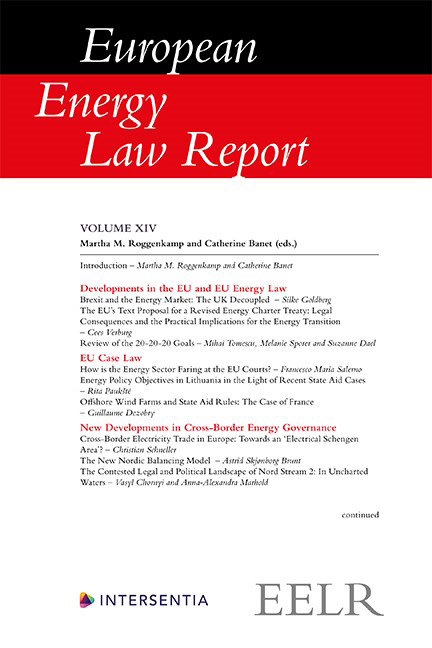Chapter XI - Energy Communities in Spain: Legal and Societal Challenges
Published online by Cambridge University Press: 26 May 2022
Summary
INTRODUCTION
This chapter analyses recent developments in Spanish legislation to implement the concept of energy communities developed in the EU ‘Clean Energy for All Europeans Package’ (CEP). Section 2 first identifies the main preconditions for these communities from a legal, economic and system perspective. It considers the potential benefits and costs of energy communities, and how to align the incentives these communities face with the wider interests of all energy consumers and society, in particular to support the energy transition at least cost. Our view is that there are two interests at stake, with the potential for conflict that should be managed: one is the interest of the members of the energy community; the other is the interest of the overall electricity system and society as a whole. Section 3 will then assess whether existing Spanish legislation properly balances those two interests and next whether the recent regulatory developments and expected legislation will do so. Section 4 offers conclusions, one of which is that Spain is still at a preliminary stage in developing legislation.
PRECONDITIONS FOR DEVELOPING ENERGY COMMUNITIES
The CEP resulted in two concepts of energy communities. Whereas Directive (EU) 2019/944 introduces and governs citizen energy communities, Directive (EU) 2018/2001 provides for the introduction of renewable energy communities. When transposing these two concepts into national law, the Spanish government needs to strike a balance between satisfying the economic, environmental, political and social objectives of energy communities and ensuring that these communities are benefiting society as a whole. This requires efficient integration of energy communities into the rest of the energy system, aligning their incentives with the objectives of the system as a whole. Below we first provide a brief overview of the key provisions in EU law governing these energy communities. Thereafter, we briefly discuss some economic challenges.
EU LAW GOVERNING ENERGY COMMUNITIES
Although a distinction is made between citizen and renewable energy communities, both communities provide an alternative model for producing, consuming or sharing energy. Below we present some of the key aspects of these communities. See Chapter X for an in depth analysis of both concepts.
- Type
- Chapter
- Information
- European Energy Law Report , pp. 219 - 238Publisher: IntersentiaPrint publication year: 2021

